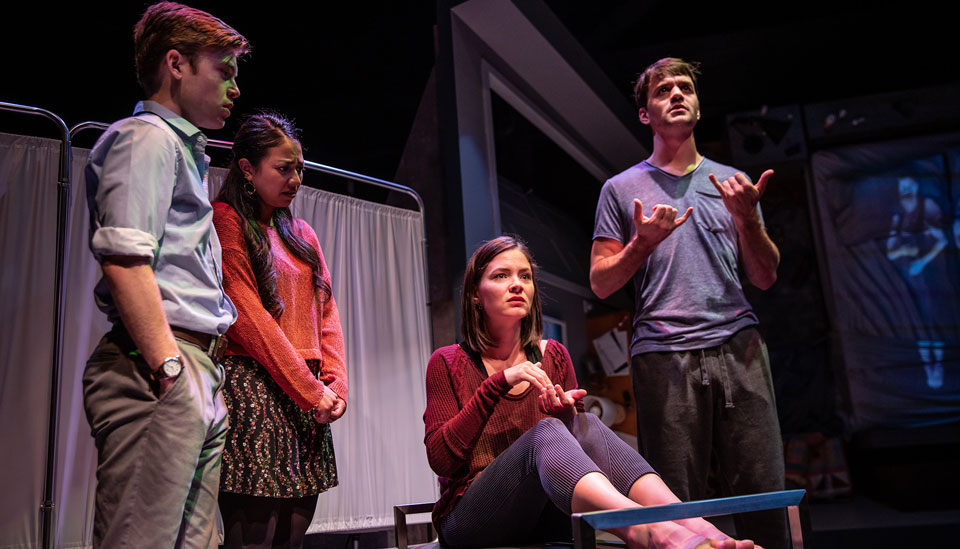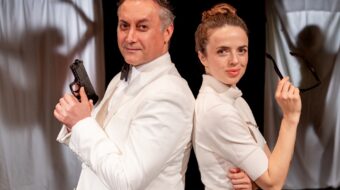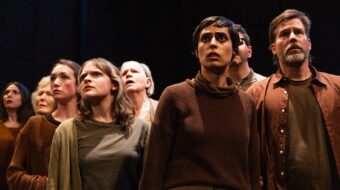
LOS ANGELES—What a gift Deaf West Theatre is to the world! As perhaps the nation’s premier artistic bridge between the deaf and hearing worlds, founded in Los Angeles in 1991, its production of the musical Spring Awakening transferred from the Inner-City Arts Rosenthal Theater in downtown L.A. to the Wallis in Beverly Hills and then on to Broadway, where it earned three Tony Award nominations including Best Revival. I haven’t seen all that many of their productions, but I was bowled over by Edward Albee’s At Home at the Zoo, in a co-production with the Wallis Annenberg Center for the Performing Arts. In 2005, DWT was selected to receive the Highest Recognition Award by the Secretary of Health and Human Services for its “distinguished contributions to improve and enrich the cultural lives of deaf and hard of hearing actors and theater patrons.”
In playwright Jack Thorne’s The Solid Life of Sugar Water, now in its American premiere production at the same theater where Spring Awakening was launched, a Deaf couple’s relationship is revealed from their meet-cute first encounter on a post office line where they are each mailing packages, through their courtship, lovemaking, pregnancy, and marriage. This frank and intensely intimate portrait of relationship is expressed by two Deaf actors in DWT’s signature performance style combining American Sign Language with the spoken English rendered simultaneously by two speaking actors.
As graphic and sensual as the language is—and for some theatergoers it may introduce for the first time in their imaginations the possibilities for intimacy for Deaf couples—the fact that the actors’ hands are used as the instruments of language does remove them to a great extent from each other’s bodies. In compensation, however, what we see in the actors, and hear from the speakers, is the stream of internal thoughts that we do not often get in a more traditional romantic representation. It would be correct to call this a bilingual production: Deaf members of the audience (and there were quite a few on opening night, Sept. 12) could fully follow along.
Sandra Mae Frank, who starred as Wendla in all three Deaf West productions of Spring Awakening—at Inner-City Arts, the Wallis and Broadway—plays Alice, alongside Tad Cooley, in his DWT debut, as Phil. Natalie Camunas and Nick Apostolina, both also making their DWT debuts, respectively voice Alice’s and Phil’s most private ruminations.
The Solid Life of Sugar Water premiered at the Edinburgh Fringe Festival prior to an acclaimed run at England’s National Theatre. In her five-star review, UK Guardian/Observer theater critic Susannah Clapp called it “unflinching…. I can’t remember when I last saw a play that was at once so forthright and so delicate.”
An English screenwriter and playwright, Jack Thorne is best known for the stage play for Harry Potter and the Cursed Child based on an original story by him, J.K. Rowling and John Tiffany, which won the 2017 Olivier Award for Best New Play and the 2018 Tony Award for Best Play.
The single most powerful scene in Solid Life is the one where Alice is brought to the hospital to give birth to their first child only to learn that it’s a stillborn—which is not a spoiler because the author has published his thoughts about this incident. The play, he says, “is not about a woman giving birth to a stillborn child. It’s about how you recover and how you get better and so this couple who have gone through this horrific thing has got to work out how to solve the problems and issues in their relationship. And this play is attempting to capture the moment when they try to solve their problems.”
In Thorne’s original conception, the play featured Alice as a Deaf character, and Phil as hearing, although both were played by speaking actors, without sign language. In DWT’s restaging, both are Deaf characters, and each has their speaking counterpart.
“This is that rare play that will be made better by the addition of sign language,” says Deaf West artistic director David J. Kurs. “The ‘bedroom speak’ will be intensely visual, a quality that will also bring greater clarity to critical events as they unfold. It’s an extraordinary look behind the curtain.”
According to director Randee Trabitz, “This is the perfect company for this show. In the (literal) hands of these actors, the play becomes a visual dance that echoes the trajectory of the story.”
Much as I might like to agree that DWT is “the perfect company,” I am not so sure the trans-Atlantic and trans-ability transformation of Thorne’s play entirely works. The relationship between a hearing and a Deaf person is inherently different from one between two hearing or two Deaf persons. I don’t mean emotionally, for disability of almost any kind still allows for a full range of human responses. But technical details of negotiating the differences are reflected in the text itself, which doesn’t match up with what we are seeing and hearing. Phil’s character, in particular, is the problematic one. There are residues in the script of Phil struggling to communicate with the Deaf Alice—he calls himself a good lipreader, for example, and he chooses an LP recording to play at Alice’s apartment on their first sex date. So one can only wonder how he could become so quickly and so competently expressive in ASL until we realize, oh, yeah, in this production, he’s supposed to be Deaf, too.
Unfortunately, I have to say this, too: In the original play, although I did not see it, presumably the characters are both British, with appropriate accents. But here, Ms. Camunas speaks Alice’s lines in American stage English and Mr. Apostolina speaks Phil’s in a rich, plummy theatrical English accent which, when he is miked for Phil’s internal thoughts, becomes even more mediated by technology, making his fine Shakespearean delivery even harder to understand. We don’t know if these characters are American, British or mixed, or even truly both Deaf or not, inconsistencies that the text, as it stands, does not help us sort out. Some rewriting for this production was in order.
I have other concerns about the text anyway. In a play that explores the nuanced, evolving relationship between two people who are frankly at different levels of emotional maturity, Thorne employs a language that is more descriptive than demonstrative, and more intellectual and mechanical when it comes to the lovemaking than the kinds of thoughts that go through most people’s minds at such moments. In terms of its language, it’s a brainier play than it needs to be; in terms of its emotional communication, more surface than depth. The intellectuality of the play operates against its affect.
I felt particularly sorry for Alice in the delivery room when she is told that her baby is “ante partum,” a clinical expression I had to unpack linguistically before I understood it myself, and at least I could hear it. Maybe that was Thorne’s way of critiquing the insensitivity of the UK’s National Health Service using such fancy Latin words on a Deaf patient during the excruciating throes of labor.
None of these criticisms are aimed at the performers themselves, however. The ensemble of four (for the speaking actors are not just off to one side but are an integral part of the action) are all supremely present in their roles.
Apart from the expertly timed and delivered performances, the staging alone is worth the price of admission! In Sean Fanning’s scenic design, we see the couple’s bedroom from the ceiling’s point of view, looking down on what physically appears to be a vertical marital bed, the headboard and nightstands, the cockeyed window on the stage left wall and a bookshelf and an open door to the next room on the other. The perspective integrity holds even when Alice brings Phil a cup of tea: We in the audience, of course, see the top surface of the liquid and are equally amused by the stagecraft when Phil successfully places the cup on the nightstand. The playfulness is highly endearing, reinforcing the several paradigm shifts we are asked to make experiencing this work (interesting that “work” and “play” here mean the same thing).
The Solid Life of Sugar Water plays at the Rosenthal Theater at Inner-City Arts, 720 Kohler St., Los Angeles 90021 (just south of Little Tokyo & the Arts District). Performances run through October 13, Thurs., Fri. and Sat. at 8 p.m. and Sun. at 3 p.m. Two ASL Nights have been scheduled on Thurs., Sept. 19 and Thurs., Sept. 26: Arrive at 7:30 p.m. for a 15-minute ASL workshop that teaches signs used in the play. For tickets call (818) 762-2998 or go to www.deafwest.org. A discount is offered to students with valid ID. Recommended for mature audiences only: adult themes, sexually graphic language. 80 minutes (no intermission). There is plenty of street parking, and there’s a free parking lot across the street.












Comments